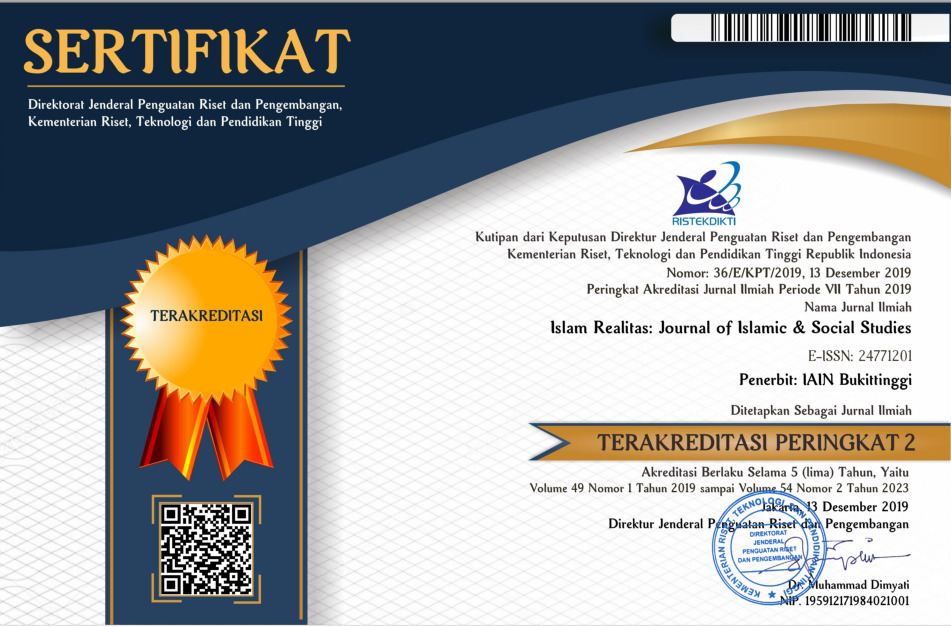Religious Moderation in the Perspective of Muslim Philosopher: Theory and Practice
DOI:
https://doi.org/10.30983/fuaduna.v6i1.5279Keywords:
Islamic Philosophy, Rational, Moderate, Tolerance, Harmony.Abstract
References
Book and Journal
Abdullah, dkk, Amin. Rekonstruksi Metodologi Ilmu-Ilmu Keislaman. Yogyakarta: Suka Press dan LPKM Intropeksi, 2003.
Abedi, Ahamd dan Raziye Tabrizizade Isfahani. “A Comparative Study between Aristotelian Theory of Moderation and The Ethical Theory of Islam.†Philosophy of Religion 11, no. 4/4 (2015).
Al-Farabi, Abu Nasr. Fushul Al-Muntaza’ah. www.al-mostafa.com, n.d.
———. Ihsa Al-Ulum. Beirut: Dar wa Maktabah al-Hilal, 1996.
———. Risalah Al-Tanbih ’Ala Sabil Al-Sa’adah. Edited by Subhan Khalifat. Aman: Al-Jamiah al-Ardaniyah, 1987.
al-Palimbani, Abd Shamad. Anis Al-Muttaqin. Edited by Ahmad Luthfi. Jakarta: Wizarah al-Syu’un al-Diniyyah Liljumhuriyyah al-Indonesia, 2009.
Arifin, Miftah. Wujudiiyah Di Nusantara: Kontinuitas Dan Perubahan. Jember: STAIN Jember Press, 2015.
Bagir, Haidar. Buku Saku Filsafat Islam. Bandung: Penerbit Arasy, 2005.
Bano, Neelam, and dan Humaira Ahmad. “Religious Pluralism: The Perspective of Twentieth Century Muslim Perennial Philosopher of Frithjof Schuon.†Al-Qamar 3, no. 1 (2020): 1–16.
Brown, John R. Islam, Law and Equality in Indonesia: An Anthropology of Public Reasoning. Cambridge: Cambridge University Press, 2003.
Corbin, Henry. History of Islamic Philosophy. History of Islamic Philosophy. London and New York: Kegan Paul International, 2014.
Fakhry, Majid. A History of Islamic Philosophy. Columbia University Press, 2004.
———. Al-Farabi, Founder of Islamic Neoplatonism: His Life, Works, and Influence. Oxford: Oneworld Publications, 2002.
Godefroid, Callatay de. Ikhwan Al-Safa’: A Brotherhood of Idealists on the Fringe of Orthodox Islam. Oxford: Oneworld Publications, 2005.
Ivry, Alfred L. Al-Kindi’S Metaphysics: A Translation of Ya’qub Ibn Ishaq Al-Kindi’s Treatise on First Philosophy (Fi Al-Falsafah Al-Ula). New York: State, 1974.
Kamali, Mohammad Hashim. The Middle Path of Moderation in Islam: The Qur’anic Principle of Wasatiyyah. Oxford: Oxford University Press, 2015.
Kartanegara, Mulyadhi. Panorama Filsafat Islam: Menembus Batas Waktu. Bandung: Mizan, 2002.
Kolis, Nur. “Wahdat Al-Adyan: Moderasi Sufistik Atas Pluralitas Agama.†TAJDID: Jurnal Pemikiran Keislaman Dan Kemanusiaan 1, no. 2 (2017): 166–80. https://doi.org/10.52266/tadjid.v1i2.42.
Manshur, Fadlil Munawwar & Husni Husni. “Promoting Religious Moderation through Literary-Based Learning: A Quasi-Experimental Study.†International Journal of Advanced Science and Technology 29, no. 6 (2020): 5849–55.
Martin, Richard C., and Mark R.Woodward, and with Dwi S. Atmaja. Defenders of Reason in Islam: Mu’tazilasm from Medieval School to Modern Symbol. Oxford: Oneworld Publications, 2003.
Muthahhari, Murtadha. The Theory of Knowledge: An Islamic Perspective,. Kuala Lumpur: Amir Research and Cultural Center (ARCC), 2011.
Muzani, Saiful. Islam Rasional Gagasan Dan Pemikiran Harun Nasution. Bandung: Mizan, 1996.
Nasr, Seyyed Hossein. The Islamic Intellectual Tradition in Persia. New York: Curzon Press, 1996.
Netton, Ian Richard. Allah Transcendent: Studies in the Structure and Semiotics of Islamic Philosophy, Theology and Cosmology. London and New York: Routledge Taylor and Francis Group, 2006.
Seyyed Hossein Nasr. Knowledge and the Sacred. Gifford Lectures. State University of New York Press, 1989. https://books.google.co.id/books?id=DsooAQAAMAAJ.
Shihab, Quraish. Wasathiyyah: Wawasan Islam Tentang Moderasi Beragama. Ciputat: Lentera Hati, 2020.
Sihabuddin. “Allamah Tabataba’is View on Nafs Al-Amar: An Ontological Basis for the Correspondence of Proposition.†Ulumuna: Journal of Islamic Studies 20, no. 1 (2016): 51–68.
Sina, Ibn. “Tis’u Rasail Fi Al-Hikmah Wa Al-Tabi’iyyat.†Kairo: Dar al-’Arab Lilbustani, 1989.
Tim Penyusun Kementerian Agama RI. Moderasi Beragama. Jakarta: adan Litbang dan Diklat Kementerian Agama RI Gedung Kementerian Agama RI, 2019.
Tim Pokja Moderasi Beragama Kementrian RI. Peta Jalan (Roadmap) Penguatan Moderasi Beragama Tahun 2020-2024. Jakarta: Kementerian Agama RI, 2020.
Widyaningsih, Rindha, S Sumiyem, and K Kuntarto. “The Potential of Religious Radicalism Movement in Banyumas.†Walisongo: Jurnal Penelitian Sosial Keagamaan 25, no. 1 (2017): 203. https://doi.org/10.21580/ws.25.1.1807.
Interview
Abror, Robby Habiba (Lecturer of UIN Yogyakarta), Interview, 2020.
Bakhtiar, Amsal (Lecturer of UIN Jakarta), Interview, 2020.
Julhendra (Student of UIN Padang), Interview, 2020.
Nurman, Silmi Novita (Alumni of UIN Padang), Interview, 2020.
Rais, Zaim. (Lecturer of UIN Padang), Interview, 2020.
Wardana, Ghufron Akbari (Student of UIN Jakarta), Interview, 2020.
Downloads
Published
How to Cite
Issue
Section
Citation Check
License
Copyright (c) 2022 Humaidi Humaidi

This work is licensed under a Creative Commons Attribution-ShareAlike 4.0 International License.
Authors who publish with this journal agree to the following terms:
- Authors retain copyright and grant the journal right of first publication with the work simultaneously licensed under a Creative Commons Attribution-ShareAlike 4.0. that allows others to share the work with an acknowledgment of the work's authorship and initial publication in this journal.
- Authors are able to enter into separate, additional contractual arrangements for the non-exclusive distribution of the journal's published version of the work (e.g., post it to an institutional repository or publish it in a book), with an acknowledgment of its initial publication in this journal.
- Authors are permitted and encouraged to post their work online (e.g., in institutional repositories or on their website) prior to and during the submission process, as it can lead to productive exchanges, as well as earlier and greater citation of published work (See The Effect of Open Access).





